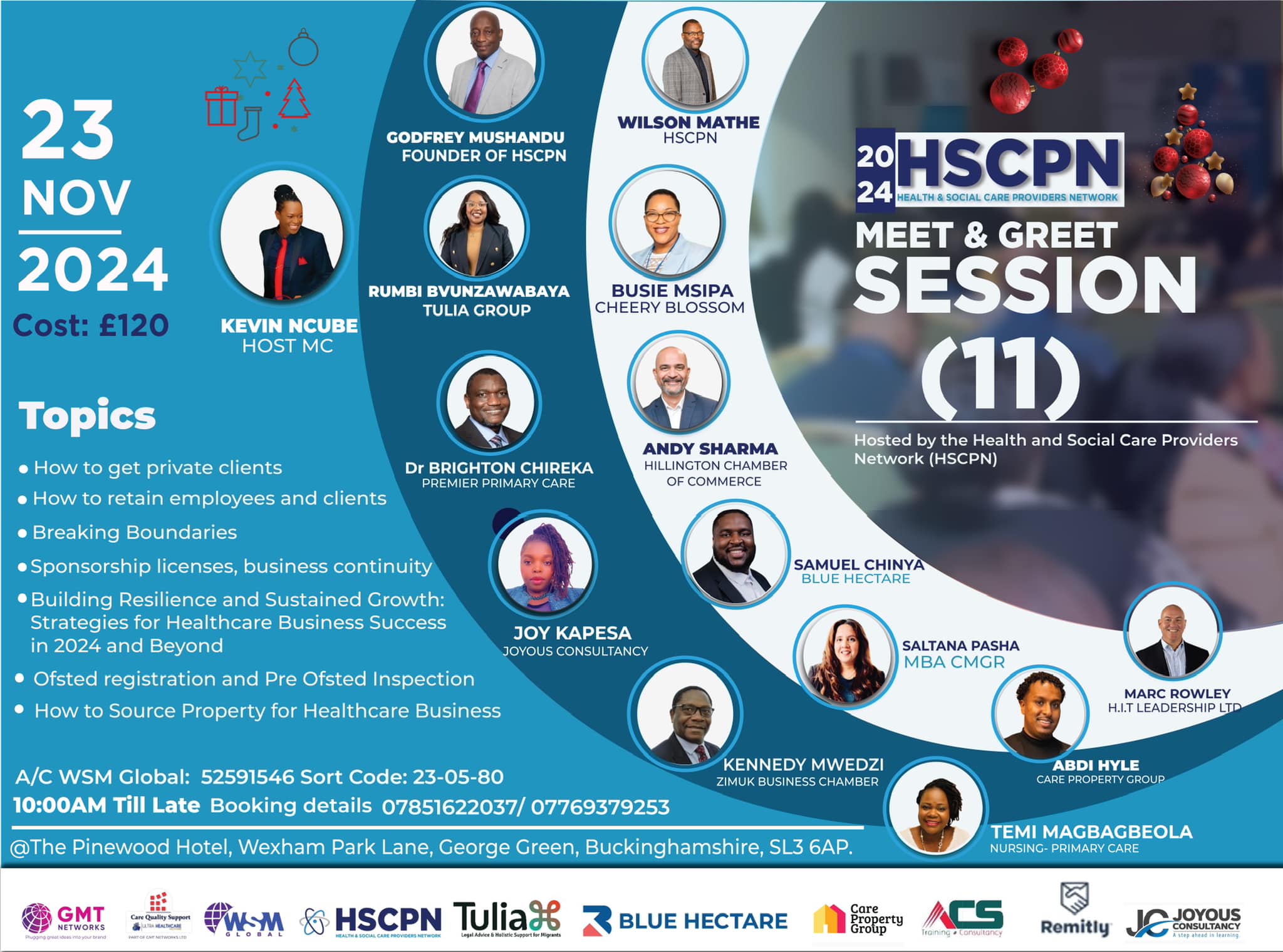Meet and Greet Session 12
Meet and Greet 12: Passionate Speakers, Insightful Updates, and Engaging Networking in Health and Social Care
The recent Health and Social Care Sector Conference, held on March 22nd 2025, was nothing short of outstanding. The event brought together an array of knowledgeable speakers who not only shared crucial updates but also conveyed their passion for making a difference in the sector. From discussions on salary changes, property investment, and financial management, to leadership and care provision, the event was a deep dive into the challenges and opportunities facing the industry.
The event kicked off with Stan, a property investment expert, who captured the audience’s attention with his energetic talk on property investment. He touched on key points such as how to acquire properties, which types are worth investing in, and the importance of having a strategic follow-up plan. His passion for helping businesses secure loans was evident, and he offered valuable insights for aspiring property investors. Stan’s words of encouragement resonated with the audience, urging them to never give up on their dreams, including the dream of owning a home, emphasising that with the right help, it’s achievable.
Next, Sam, an account firm director, spoke on the often-daunting topic of HMRC inspections. His detailed explanation of the inspection timeline and the importance of accurate record keeping resonated with many in the room. Sam provided practical tips on avoiding financial pitfalls and emphasised the legal implications of maintaining proper accounts. One of the most memorable parts of his presentation was the interactive exercise where attendees filled out a yearly goal plan, which Sam will revisit and send out at the end of the year to see if participants achieved their objectives. This exercise encouraged personal and professional goal setting, reinforcing the importance of continuous development.
Andrew from Tann Law followed with a thorough breakdown of the recent changes to the minimum wage and salary thresholds. His focus on the legal consequences of failing to adhere to these new standards was crucial, especially for organisations that may unintentionally underpay their employees due to a lack of awareness. Andrew’s session was a reminder to all in the room to stay up to date with legal and financial changes in the sector, as the penalties for non-compliance can be significant.
Following Andrew, Sultana, a former CQC inspector now working as a consultant, shared her invaluable insights on the CQC inspection framework. She discussed the importance of staying informed by regularly visiting the CQC website, which provides transparent information for organisations looking to pass inspections. Sultana shared a case study of a client whose initial inspection rating was challenged and successfully changed, reinforcing her point that don’t accept your rating at face value you can always challenge unfair decisions. She also pointed out that CQC often allows a grace period for improvements, and such changes will not be reflected negatively in the final report, a useful tip for those navigating the inspection process.
Godfrey, one of the founders of the Health and Social Care Providers Network, concluded the speaker sessions with a motivational talk on business and personal growth. His insights on the importance of thinking outside the box were particularly compelling for attendees in the health and social care space, urging them to be creative and flexible in how they approach business and care delivery. He encouraged everyone to continuously develop their own skills and leadership abilities to stay ahead in this ever-evolving field. For those wanting to explore this further, WSM Global recommends checking out his blog, Expanding Opportunities In Health and Social Care, which delves deeper into these themes.
As the event progressed, the mood lightened thanks to the MC Danai, whose humour and wit kept the atmosphere lively. Danai also shared her own experiences as a manager and director, offering valuable leadership advice that complemented the speakers’ presentations. The arrival of Kevin, an MC from BBC Radio, added another layer of excitement. Kevin’s engaging style made every conversation feel like a live radio interview, creating an unforgettable experience for everyone.
The night culminated in lively networking opportunities, enhanced by the opening of the dance floor and upbeat music from DJ Tams. Attendees mingled, had drinks, and enjoyed the social side of the event. Despite being an event focused on sharing professional knowledge, it was clear that participants also appreciated the chance to relax, have fun, and build connections in a less formal setting.
Conclusion
The Meet and Greet 12 Health and Social Care Conference in March 2025 was a remarkable event that successfully balanced professional updates with an enjoyable and interactive atmosphere. Each speaker brought valuable insights to the table, whether discussing the latest legal changes, property investment strategies, financial management, or leadership growth. The event was not just about learning; it was a chance to reflect, network, and unwind, making it a comprehensive experience for all who attended.
The Importance of Discipline in Recruitment -Meet and Greet Session 12
During the recent Meet and Greet session, one of the speakers shared valuable insights regarding the challenges faced by individuals brought in from Africa without sufficient preparation or understanding of the cultural and legal differences they would encounter. The speaker highlighted several important issues that need to be addressed to ensure a smoother transition and better support for these individuals. Below are some of the key concerns she raised:
One of the biggest problems mentioned at the meet and greet is *lack of discipline in recruitment*. Now, they were not talking about discipline in the traditional sense. They spoke about the *discipline* that directors and organisations need to have when selecting and training new employees. This isn’t just about filling vacancies, it’s about ensuring that the right people, with the right training and mindset, are coming into the system.
The issue we’re seeing is that a lot of *organisations just don’t have the knowledge or understanding of how the UK system works*. This means they’re bringing in people who may not be prepared for the cultural differences, the legalities, and the standards required. And this can lead to huge issues like something as simple as a “pat” leading to an *assault charge*. What’s supposed to be a routine task can escalate into a *serious legal matter* because of a lack of understanding.
Cultural Differences and Misunderstanding
The lack of understanding of cultural differences is another big problem. A simple mistake, like not knowing how to clean a toilet properly, can snowball into a much bigger issue. It sounds like a small thing, right? But when there’s no proper training or guidance, that small mistake could lead to serious problems.
Also there is the issue of behaviour that is completely unacceptable in the UK, like *urinating in public*. Some of the people coming into the country just don’t understand that these are things that simply cannot happen here. If we don’t make it clear, they’ll never know. And when things go wrong, the consequences can be severe, it can even result in criminal charges or deportation, which no one wants.
The Cost of Cutting Corners
One of the biggest mistakes that I see is when people try to *cut corners*. Whether it’s with training, understanding cultural norms, or getting the right certifications, cutting corners can have a massive impact on your life here. I’m talking about everything from *driving* to *understanding the weather*. Little mistakes add up. And when they do, the consequences can be much bigger than just a bad day at work.
If you’re cutting corners in any area of your professional life, whether it’s recruitment or personal conduct, it’s going to catch up with you. It’s too risky. Especially in sectors like health and social care, where people’s lives are at stake. There’s no room for mistakes when it comes to keeping people safe.
The Need for Self-Awareness and Accountability
The speaker was not just talking about directors here. *Self-awareness* is something we all need. We all need to take responsibility for our actions, our training, and the culture we create in our workplaces. Telling people to be *respectful*, to *observe the law*, and to *treat others with dignity* is not hard. It doesn’t cost much. It’s just about taking responsibility for what we’re doing and how we’re doing it.
So, here’s my big question to the directors out there: Are you preparing your employees for the environments they’ll be working in? Are you doing your *due diligence* before recruiting people and bringing them into the UK? Because if you’re not, you’re not just doing a disservice to your employees, you’re putting the whole organisation and your clients at risk.
There is also a critical issue regarding recruitment and ensuring that employees are adequately prepared for the country they are being brought into. The current lack of due diligence in recruitment is a significant concern. It is illegal, for instance, to leave children under the age of 12 unsupervised in certain settings, yet employees were not informed of this, leading to a situation involving Child Services and potential deportation. This demonstrates the vital importance of ensuring all employees are fully aware of the legal and cultural expectations before being placed in such roles.
To wrap up, I want to say this: In health and social care, we all have a part to play in making sure that we’re creating safe, respectful, and professional environments. Directors need to be the *leaders* they’re supposed to be, and employees need to take responsibility for their actions and their growth. Together, we can create a better, more disciplined sector. I strongly urge a review of the recruitment and training processes to ensure that all employees are thoroughly vetted and adequately prepared. Failure to do so can lead to serious consequences, both for the individuals involved and for the organisation as a whole.
Expanding Opportunities in Health and Social Care:
Thinking Outside the Box
The health and social care sector is incredibly diverse, encompassing various areas that provide vital services to those in need. At the heart of this sector are three primary services: domiciliary care, children’s services, and supported living. However, many providers are missing out on the wide range of opportunities available in non-emergency services, including transport services.
As many professionals in health and social care continue to face challenges in finding funding and expanding their businesses, it’s essential to explore the available options and think outside the conventional framework. This is where significant government funding and the right strategic approach can make all the difference.
The Power of Government Funding in Health and Social Care
In recent years, substantial funding has been allocated to support the growth and development of services within the sector. For instance, the UK government has set aside £1.3 billion to help with the development of non-emergency services, including transport. Additionally, £600 million has been earmarked specifically for children’s services.
This funding can be a game-changer for companies looking to expand their services or those trying to establish themselves in the market. It’s important to understand that accessing this funding often requires knowing where to look and how to submit tenders for bidding. Many individuals and organisations miss out because they don’t fully understand the process or where to find opportunities.
Tendering and Bidding: The Gateway to New Opportunities
Tendering is one of the most common ways for organisations to secure contracts within the health and social care sector for big projects. There are numerous platforms and opportunities to submit tenders, but finding the right ones can be a challenge if you don’t know where to look. Thankfully, there are resources available to help organisations navigate the tendering process.
One of the key advantages of submitting a tender is that you don’t need to have a pre-existing network or client base in the area where you wish to operate. You just need to know how to write a compelling and effective tender that demonstrates your expertise and ability to meet the requirements of the project. Whether you’re a start-up or an established business, the tendering process opens up new doors and possibilities for growth.
Overcoming the Challenges of Business Ownership
Starting a business in the health and social care sector is not without its challenges. For example, registering a company may not require you to have clients but not having a stable connection to start with such as client base, which can be difficult to maintain, especially in the early stages can hurt your funding and starting of your business as you need to secure a place where you clients will be put in. Even without clients in those homes you are still expected to make payments in the homes that you have secured so having partnership and connections can help you tackle this issue. Furthermore, there is new information circulating that suggests businesses in this sector may now need to have a partnership in place to register successfully to meet the funding quota.
This shift highlights the importance of collaboration and support. The days of “going it alone” are over, and the “Me Syndrome” (the idea that we can do everything ourselves) is no longer a viable approach. We all need support and guidance to succeed, and in today’s sector, it’s important to recognise the value of partnerships and building a wider network.
The Role of Agency Staffing in Health and Social Care
Another area where providers may want to think outside the box is in agency staffing. The agency staffing landscape within health and social care has evolved significantly over recent years. With increased demand for healthcare workers, particularly in domiciliary care and supported living services, agencies are playing a critical role in bridging staffing gaps.
However, as with any service, it’s important to ensure that the agency you work with provides high-quality workers who are fully trained and meet the standards expected in the industry. Whether you’re hiring agency staff for short-term or long-term assignments, ensuring that the staff is fully aligned with your organisation’s values and objectives is key to providing excellent care.
Investing in Ourselves and Our Growth
In the hustle and bustle of running a health and social care business, it’s easy to forget the importance of investing in yourself. Are we truly investing in our personal growth and development, both as individuals and as organisations? Are we taking the necessary steps to grow and improve our skills, knowledge, and understanding of the sector?
The health and social care landscape is vast and constantly evolving. In order to remain competitive and successful, we must continuously educate ourselves and invest in our own professional development. This could involve attending training courses, networking with peers, or even hiring a business consultant to help guide your organisation to success.
A Balanced Approach: Taking Time to Relax
The pressures of running a health and social care business are real. Many individuals in the sector, particularly those in leadership roles, have not taken a holiday in years because they fear that things may go wrong in their absence. The constant pressure to ensure everything runs smoothly can be overwhelming. However, it’s essential to recognise that rest is equally important for long-term success.
One of the key ways to mitigate this stress is by putting robust processes and systems in place. When you have clear processes, you can relax and step away from the business knowing that everything is running as it should be. This is not only important for your own mental health but also for the sustainability and future growth of your business.
Conclusion: Expanding the Horizon of Health and Social Care
The health and social care sector offers incredible opportunities for those willing to think outside the box and explore new avenues. With significant funding available, various tendering opportunities, and the evolving role of partnerships, the time to act is now. Whether you’re focused on domiciliary care, children’s services, supported living, or non-emergency transport, there’s a wealth of options to explore.
By investing in yourself, embracing collaboration, and focusing on creating efficient processes, we can all contribute to a stronger, more innovative health and social care sector. Together, let’s challenge the norm, think creatively, and make a lasting impact on the people we serve.












